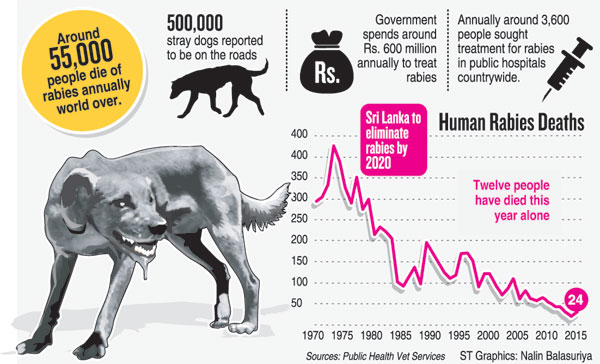News
Huge stray dog numbers neuter rabies fight
 The increasing number of stray dogs is nullifying the best efforts of authorities trying to combat rabies.
The increasing number of stray dogs is nullifying the best efforts of authorities trying to combat rabies.
There are about half a million stray dogs reported to be on the roads and annually around 3,600 people seek treatment for rabies in public hospitals countrywide.
Twelve people have died to date from rabies; 24 deaths were reported last year. Responding to World Rabies Day held last Wednesday under the theme of “Educate, vaccinate and eliminate rabies”, the Ministry of Health declared that Sri Lanka would eradicate rabies by 2020.
The government spends around Rs. 600 million annually to treat rabies.
“These funds could be saved once rabies is eradicated from the country,” Health Services Director General Dr. Palitha Mahipala said. “Vaccines and serum are available at all leading state hospitals and specific centres for the victims of suspected dog bites. The advanced medical treatment has lowered the death rate”, Dr. Mahipala added.
In 80 per cent of cases, the victims, including pet owners, neighbours and visitors, contracted rabies after being bitten by household dogs. Most of the cases were reported from the Western Province.
Dr. Mahipala said it was a huge challenge to control this large population with such a small budget
About 30-40 people die annually of rabies in Sri Lanka – among some 55,000 deaths around the world – and the mortality rate could be reduced if people sought rapid medical attention for bites and more dogs were vaccinated.
A high percentage of rabies samples were from dogs (85.2 per cent), followed by cats (7.9 per cent) humans (3.8 per cent), wild animals (2 per cent), and livestock (1 per cent), Public Health Vet Services Director Dr. Lionel Harischandra said.
Dr. Chamith Nanayakkara of the Association of Veterinarians said at present only 75 per cent of the dog population was vaccinated.
In order to eradicate dog rabies 70 per cent of the dog population in Sri Lanka needs to be vaccinated with medication that lasts for three years.
“Most people tended to ignore bites and this could be fatal if treatment was not sought immediately, especially if the dog is a stray one,” Dr. Nanayakkara said.
He called for new laws that would allow action to be taken against people who abandon pups on the street.
When a dog bites, whether it is a pet or stray, it is important to wash the bitten area under a running tap for about 10-15 minutes and seek immediate medical treatment. Dr. Nanayakkara said one reason for the high incidence of cases was the failure of pet owners to keep track of when the rabies vaccine had to be administered. He said pet owners should seek the assistance of health authorities were not sure about the date.
Health authorities are lukewarm about setting up rabies labs at provincial level, saying rabies testing was specialised and could not be performed in an ordinary lab because it is an infectious disease.

